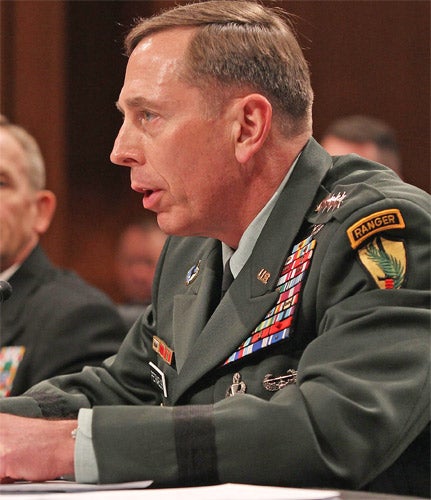Rupert Cornwell: US can't resist a man in uniform
Out of America: Petraeus's posting to Afghanistan only strengthens the rumours about his political ambitions

Petraeus in 2012? Make that Petraeus 2016, the smart money here now says. Ostensibly the great drama of these past few days has been the downfall of General Stanley McChrystal, until five days ago the top US and Nato commander in Afghanistan. But there's a splendid "only in America" subplot, too: a new guessing game over the political ambitions of the man who's taking over, General David Howell Petraeus.
Like nowhere else on earth, this country loves its military. The last soldier to be British prime minister was the Duke of Wellington, in the 1830s. More than a century later some tried to get Bernard Montgomery, our most charismatic field commander of modern times, into politics. But he would have none of it. The victor of El Alamein settled instead for his memoirs and a viscountcy.
However, his American counterparts have had fewer inhibitions. Since Wellington occupied Downing Street, 10 generals have won the presidency – the last of them was Dwight Eisenhower in 1952 – and dozens of others have become household names. The love affair was briefly interrupted by Vietnam; America has no time for losers, in uniform or out. But it resumed once the US started winning wars again, and has only intensified as the public yearns for something other than politics as usual.
Colin Powell, a former chairman of the Joint Chiefs of Staff, was the most popular public figure in the country when he considered a White House bid in 1996; had he taken the plunge, he might have been America's first black president while Barack Obama was still lecturing at the University of Chicago. Eight years later, Wesley Clark, a former Nato supreme commander, tried as a Democrat, but, for all his brains and polish, he lacked the required political skills.
Though neither attained the prize, both men were proof of the enduring appeal of the soldier-politician – the unsullied and uncompromised hero who can "sort things out". So long, that is, as he knows his place. Which brings us back to the unfortunate General McChrystal.
A sense of proportion is in order. For President Obama, last week wasn't a June rerun of Seven Days in May, the magnificent 1964 movie by John Frankenheimer, which dealt with an attempted military coup led by a popular general against a president who has signed an arms deal with Moscow to eliminate nuclear weapons.
As it happens, the US and Russia have just agreed a new treaty to reduce their nuclear arsenals, and many conservatives strenuously oppose it. But that had nothing to do with the sacking of McChrystal – or if it did, then coup attempts don't come any more amateurish than mouthing off about the president and his top officials in a Paris bar to a reporter from Rolling Stone.
Nor was it a "MacArthur moment", comparable to 1951 when Harry Truman sacked the five-star general Douglas MacArthur for advocating an attack on China during the Korean war in defiance of presidential instructions.
But the film, the MacArthur crisis and the McChrystal disgrace do have one important thing in common: each involved the assertion of civilian control over the military, enshrined in the president's role as commander-in-chief. It is a clear line, one that David Petraeus would never overstep.
Talk that Petraeus might one day be a presidential candidate has been around since 2007, when he emerged as the architect of the counter-insurgency strategy that is supposed to have turned US fortunes around in Iraq. He's very clever, very competitive and very ambitious.
Until now the assumption had been that the likely year was 2012, and by the time he visited New Hampshire, the traditional place to test the presidential waters, the talk had grown so loud that Petraeus felt obliged to issue a categorical denial. As head of US Central Command, he was merely making himself "accessible to the American people", he told reporters. "I will not, ever, run for political office, I can assure you."
Well, he would say that, wouldn't he? To adopt the old joke about a lady, when a politician says no he means maybe, when a politician says maybe he means yes – and if he says yes, he's no politician. And General Petraeus, like Eisenhower and Powell before him, is a politician to his fingertips.
Even if you take the demurral at face value, it does not rule out the possibility of a draft, just as Eisenhower allowed himself to be drafted in 1952. Like Eisenhower, Petraeus is courted by both parties. Apparently, he is registered as a Republican, but his public remarks betray no political leanings.
However, the equation has been changed by the Afghan job. His tour will last at least a year, probably longer, leaving him no time to organise a 2012 bid. But a run four years later suddenly makes a lot more sense – especially if Petraeus manages to extricate the US with honour.
His prestige would be huge, the country's debt to him colossal, and his name recognition stratospheric. He would have plenty of time to prepare for a campaign, and he would not be in the uncomfortable position of opposing his current commander-in-chief.
This scenario has any number of holes. Obama could lose to a Republican in 2012. Afghanistan might turn into another Vietnam. Most importantly of all, maybe Petraeus genuinely doesn't want the job, preferring by far to be remembered as a successful general than as a failed president. Or, as Monty put it, "War is a pretty rough and dirty game. But politics!"
Join our commenting forum
Join thought-provoking conversations, follow other Independent readers and see their replies
Comments
Bookmark popover
Removed from bookmarks